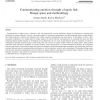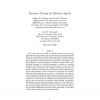6874 search results - page 1351 / 1375 » The future of human-computer interaction |
AAMAS
2005
Springer
13 years 7 months ago
2005
Springer
Agents in a competitive interaction can greatly benefit from adapting to a particular adversary, rather than using the same general strategy against all opponents. One method of s...
IJMMS
2007
13 years 7 months ago
2007
Communication of affect across a distance is not well supported by current technology, despite its importance to interpersonal interaction in modern lifestyles. Touch is a powerfu...
TVCG
2008
13 years 7 months ago
2008
We present four studies investigating tools and methodologies for artist-scientist-technologist collaboration in designing multivariate virtual reality (VR) visualizations. Design ...
CN
2000
13 years 7 months ago
2000
We envision a future in which the global economy and the Internet will merge and evolve together into an information economy bustling with billions of economically motivated softw...
EC
2000
13 years 7 months ago
2000
Holland's Adaptation in Natural and Artificial Systems largely dealt with how systems, comprised of many self-interested entities, can and should adapt as a whole. This semin...



